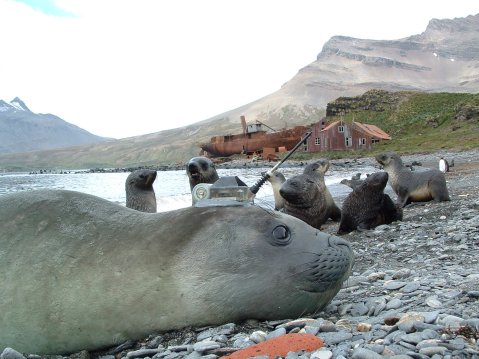New insights into seal behaviour
An international team of scientists led by the University of St Andrews has witnessed for the first time the behaviour of the southern elephant seal and its interactions with its physical environment.

The St Andrews marine biologists collaborated with the British Antarctic Survey and a number of international bodies to track the movement of 85 seals using new sensor technology. The study, which also collected data about the marine environment, could be fundamental in predicting how seals may respond to future climate change.
The seals were tracked through some of the most remote and harsh environments in the world using sensors the size of a pack of cards. They were tagged at the islands of South Georgia, Kerguelen and Macquarie in the Southern Ocean, and at the western coast of the Antarctic Peninsula. The data from the seals was then transmitted back to land via satellite and shows that elephant seals adopted different strategies to find food.
Dr Martin Biuw and Professor Mike Fedak of the Sea Mammal Research Unit at the University of St Andrews led the research. They said, “This data is really exciting. This new technology has allowed us to see where the seals go and understand their behaviour in the context of different characteristics of water in the Southern Ocean. The majority of animals from South Georgia fed within the Antarctic Circumpolar Current, but seals from other locations had a very different strategy, and visited colder waters nearer the continental shelf.
They added, “This approach helps us to understand current population trends, where the animals forage and predict the availability of food under various climate change scenarios.”
Dr Mike Meredith, Head of the Atmosphere and Ocean Group at British Antarctic Survey commented, “The Southern Ocean is the hardest place in the world to obtain oceanographic data, especially during the wintertime. The seals acted as ‘samplers’ to collect data from deep seas that we couldn’t ordinarily access due to their remoteness and harsh environments. Understanding how these animals respond to changes in their environment is fundamental in predicting how they may respond to climate change and the consequent changes in ocean circulation and ice dynamics.”
The research was funded by the Natural Environment Research Council.
ENDS
Weblinks:
http://biology.st-andrews.ac.uk/seaos/index.html
Issued jointly by the Press Offices of the University of St Andrews and British Antarctic Survey.
NOTE TO EDITORS:
THE RESEARCHERS ARE AVAILABLE FOR INTERVIEW:
ST ANDREWS –
Dr Martin Biuw, Sea Mammal Research Unit tel 01334 462677, email: [email protected]
Professor Mike Fedak, Sea Mammal Research Unit, tel 01334 463218 email: [email protected]
BAS –
Dr Mike Meredith, British Antarctic Survey tel 01223 221586, email: [email protected]
Press Office contacts –
University of St Andrews:
Gayle Cook tel 01334 462530, mobile: 07900 050103 email: [email protected]
British Antarctic Survey:
Athena Dinar tel 01223 221414, mobile: 07740 822229 email: [email protected]
Linda Capper tel 01223 221448, mobile 07714 233744 email [email protected]
NOTE TO PICTURE EDITORS:
IMAGES ARE AVAILABLE FROM THE PRESS OFFICE – CONTACTS BELOW.
Ref: Elephant seals 080807
View the latest University press releases at www.st-andrews.ac.uk
Category Research